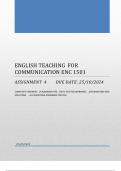Other
ENC1501 assignment 4 2024
- Institution
- University Of South Africa (Unisa)
ENC1501 Year Module DEPARTMENT OF EARLY CHILDHOOD EDUCATION Due Date :25 October 2024 ASSESSMENT 4 English Teaching for Communication Question 1 1.1 Discuss with examples how a teacher can engage with texts critically when writing assignments or preparing notes. Engaging critically with texts i...
[Show more]



